by Lisa Cooke | Nov 6, 2013 | 01 What's New, History, Newspaper
Newsboys or “newsies” used to sell the news. But for a time in American history, they were the news!
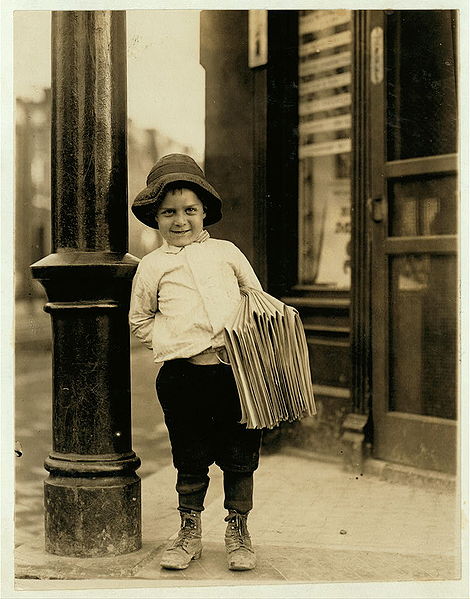
Newsboy. Little Fattie. Less than 40 inches high, 6 years old. Been at it one year. May 9th, 1910. Location: St. Louis, Missouri. Wikimedia Commons image, original at Library of Congress.
You’d know them by their common call: “Read all about it!” It was their job to sell stacks of inexpensive newspapers on every street corner that would support them. The Library of Congress has posted a fascinating page about the history of newsies, including their own appearance in the papers.
In 1899, newspaper prices rose–and that cut into the profit margins of boys who had very little profit to begin with. In New York City, many newsboys refused to sell papers published by Pulitzer and Hearst. Over the next few years, the newsboys didn’t exactly unionize, but they did organize. Eventually they formed the National Newsboys’ Association, which evolved into today’s Boys Club and Girls Club.
It’s interesting to read how the newspapers reported the doings of the boys who were essentially their salespeople. I bet it was a tricky place to be caught: a newspaper couldn’t afford to totally alienate their own best salesmen. Those salesmen were actually children, whom nobody wants to be accused of targeting. But their activities were aimed at driving down prices. In some cases, you see newspapers taking “the high road” and reporting charitable efforts to help these boys, like this story from the 1909 Washington Herald:
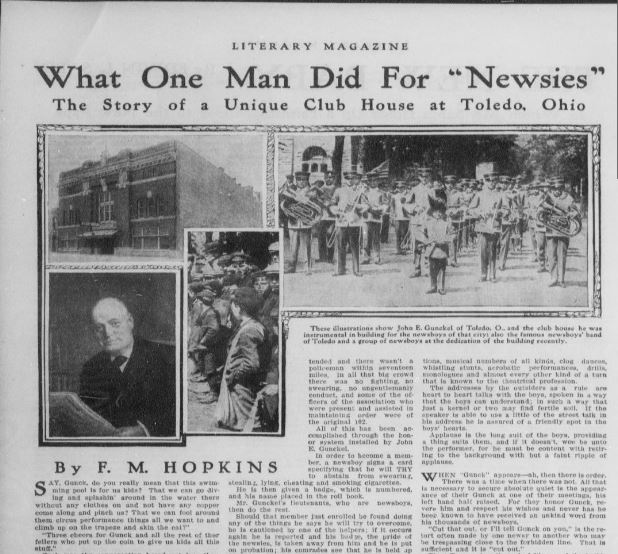
Click here to read this full story on Chronicling America. And click here to “read all about” newsboys and their role in American newspaper life.

Remember, stories like these are the kind that shaped our ancestors’ lives. Whether we find our relatives mentioned directly in the paper or we just see what life was like around them, we can learn so much from reading the same newspapers they did. Learn more from my book How to Find Your Family History in Newspapers–and Genealogy Gems Premium Subscribers can check out “Getting the Scoop on Your Ancestors in Newspapers” in the Premium Videos section.
by Lisa Cooke | Nov 5, 2013 | 01 What's New, Military
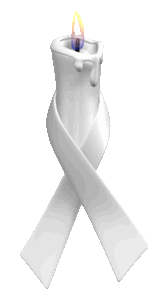 There’s a saying that “past is present,” and nowhere is that truth more apparent than family history. Sometimes we get very stark reminders that the same things that affected our ancestors–war, poverty, conflict and the like–affect us today.
There’s a saying that “past is present,” and nowhere is that truth more apparent than family history. Sometimes we get very stark reminders that the same things that affected our ancestors–war, poverty, conflict and the like–affect us today.
Fold 3 has added new databases with “names and related personal and service information for over six thousand men and women who died in Iraq and Afghanistan since 2001.” These databases are:
- Operation Enduring Freedom (OEF) Casualties “Operation Enduring Freedom” (OEF) is the operational codename given by the United States government to the War in Afghanistan which began in 2001 and is currently an ongoing conflict.
- Operation Iraqi Freedom (OIF) Casualties “Operation Iraqi Freedom” (OIF) is the operational codename given by the United States government to the conflict in Iraq from 2003-2010.
- Operation New Dawn (OND) Casualties “Operation New Dawn” (OND) is the operational codename given by the United States government for U.S. involvement in Iraq after Operation Iraqi Freedom ended on August 31, 2010.
According to the press report, “Every casualty links to a Memorial Page with a summary and personal details including full name, branch of service, pay grade and rank, unit, casualty location, date of death, age, residence, and more. In addition to searching for a name, you can also search on other details such as unit number, rank, date of death, or city of residence.”
These databases aren’t just posted here for distant descendants to come learn about their fallen relatives, but for us today to memorialize their lives. Anyone who creates a free Basic Fold3 registration can add to a Memorial Page by clicking the “Add” or “Edit” buttons within any of the sections: Pictures & Records, Personal Details, and Stories. On the final “About” page, you can connect to other pages on Fold3 and describe your relationship to the service member. You can also share these memorial pages with others by email, via a website link, or on Twitter, Facebook, and dozens of other social networking sites.
If you lost someone who is mentioned in these data-sets, here’s an opportunity to take some time to honor them online by adding to their Memorial page.
by Lisa Cooke | Nov 5, 2013 | 01 What's New, Family History Podcast, Family Tree Magazine, Holidays, Interviewing, Video
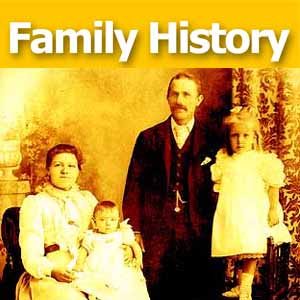 Published October 29, 2013
Published October 29, 2013
by Lisa Louise Cooke
[display_podcast]
Download the Show Notes for this Episode
Welcome to this step-by-step series for beginning genealogists—and more experienced ones who want to brush up or learn something new. I first ran this series in 2008. So many people have asked about it, I’m bringing it back in weekly segments.
Episode 5: Unlocking the Past and Home Sources
In our first segment my guest is genealogy author and publisher David Fryxell. I’m going to be talking to him about locating valuable family resources and the importance of being tenacious in your research.
Then in our second segment we’re going to help you along on your own genealogy journey by talking about the importance of scouring your home for family clues and creative and effective ways to get the words out to your relatives so that family history information finds you!
Links
Online Photo Book Publishers and Other Resources for Creating Your Family History Book
Creating a Family History Book: Start-to-Finish Guidance for Assembling and Printing a Family Keepsake
iPhoto
Kodak Gallery is now Shutterfly
Snapfish
My Family History Videos
A Nurse in Training, Part 1
A Nurse in Training, Part 2
by Lisa Cooke | Nov 4, 2013 | 01 What's New, Newspaper
Does your local library, historical or genealogical society have a newspaper collection to share? Let the NEH help!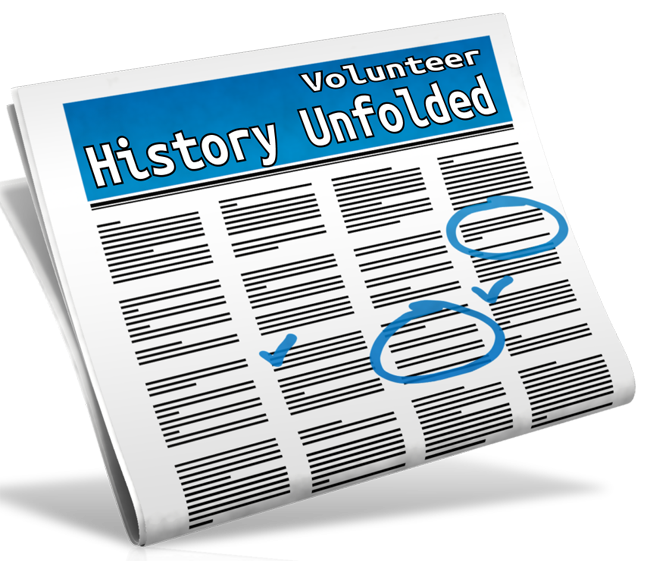
The National Endowment for the Humanities (NEH) is accepting proposals from institutions hoping to participate in the the National Digital Newspaper Program (NDNP). This program creates “a national, digital resource of historically significant newspapers published between 1836 and 1922 in U.S. states and territories.” Guidelines for 2014 are now available and proposals must be submitted by January 15, 2014.
According to the press release, “Each award supports a 2-year project to digitally convert 100,000 newspaper pages from that state’s collections, primarily from microfilm negative. Titles may be printed in Danish, English, French, German, Hungarian, Italian, Norwegian, Portuguese, Spanish or Swedish. The program provides access to this resource through the Chronicling America web site hosted by the Library of Congress. The site currently includes more than 6.6 million newspaper pages in English, French, German, and Spanish, from more than 1100 titles digitized by institutions in 30 states.”
For more program information, please visit the NEH’s program page or this page for technical information from the Library of Congress. Click here to see what institutions have participated.
I can’t say enough good things about this and other initiatives to support more digitized newspapers online. My book How to Find Your Family History in Newspapers will provide you with more about using these awesome resources to flesh out your family’s story, a tried and true research process, and loads of resources. Check it out in paperback or pdf e-book!
by Lisa Cooke | Oct 23, 2013 | Records & databases
 Mocavo recently added 5000 new databases to its site (in 5 days, no less!). According to their press release, these databases include “family and local histories, vital records, city directories, newspapers, yearbooks, and more.”
Mocavo recently added 5000 new databases to its site (in 5 days, no less!). According to their press release, these databases include “family and local histories, vital records, city directories, newspapers, yearbooks, and more.”
To see what’s new on Mocavo, click here. You can sign up for a free Mocavo basic membership to search these databases individually for free. Automated and global searching of these and over 100,000 more datasets is only possible with the Mocavo Gold membership. Happy hunting!











